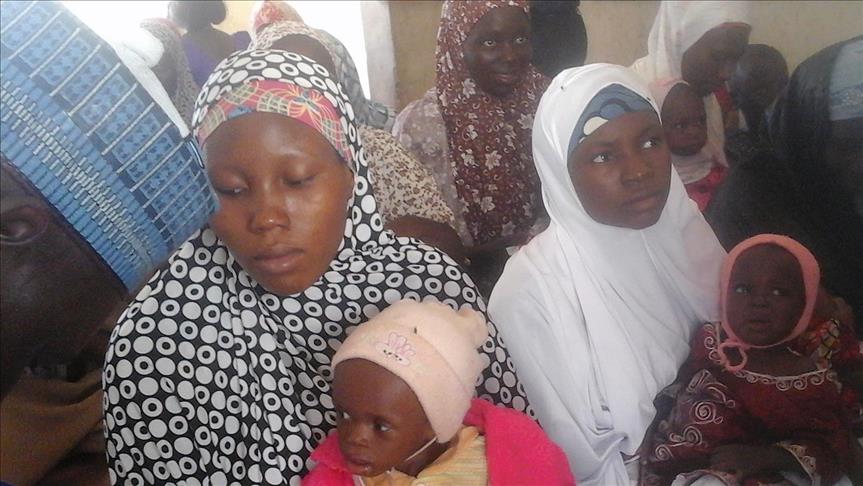Nigeria: Gender equality bill points up north-south split
'No culture or religion is excluded from complicity in early marriage,' says one analyst

Nigeria
By Rafiu Ajakaye
LAGOS, Nigeria
Last Tuesday the Nigerian senate threw out what activists have dubbed the gender equality bill, with lawmakers faulting the proposed legislation as either violating the Constitution or seeking to supplant local customs with the “foreign idea” of equality between men and women.
Sponsored by senate minority whip Biodun Olujimi, the bill seeks an “Act to Incorporate and enforce certain provisions of the United Nations Convention on the elimination of all forms of discrimination against women, the Protocol of the African Charter on Human and People’s Rights on the rights of women in Africa, and other matters connected therewith, 2016.”
Among other provisions, such as granting inheritance rights to widows in “equitable shares” and barring all forms of inhumane practices against women, section 19b of the bill specifically says, "The minimum age of marriage for women shall be 18 years."
While this provision of the bill is in agreement with the country's Marriage Act and the controversial Child Rights Act (CRA), it contradicts Item 61 of the Second Schedule of the Constitution which strips parliament of the powers to regulate marriages contracted under Sharia or customary law. Eleven of 19 northern states have refused to adopt the CRA partly because it pegs the age of marriage.
Northern senators who are mostly Muslims insisted that the bill runs afoul of constitutional provisions such as one that disallows regulation of Muslim marriage by parliament. The agitation is led by Senator Sani Yerima, controversial for marrying a teenage Egyptian girl. Similarly, some Christian lawmakers like Emmanuel Bwacha also rose against the bill, quoting verses of the Bible to justify men’s dominance over women.
Analysts note, however, that arguments in the other direction, such as some commentators saying Sharia encourages pedophilia or child marriage and framing the debate along the line of the “Muslim north” versus “Christian south”, mirrors the deep ethno-religious divide in Nigeria.
"When debates are presented as ‘us against them’, north against south, or Christian versus Muslim, the core narrative is lost," Idayat Hassan, director of the Centre for Democracy and Development, West Africa, told Anadolu Agency about the criticisms before parliament's vote.
"Mutual distrust and superiority of one culture or religion over the other prevails. And truth be told, no culture or religion is excluded from complicity in early marriage," she added.
Idayat says the issue is better presented in terms of its advantages for the development of girls and women, as well as society.
Udo David, a commentator, agrees. "Things get blurred when sentiments and ignorance are involved. I think the provisions on widows apply more to southeastern women, who hardly have any inheritance rights and are subject to some local rituals, than Muslim women," he stated.
Political historians say item 61 in the Nigerian Constitution – among other such clauses like section 29 (4)(b), which speaks about any married woman being deemed to have come of age – was a product of political compromise as far back as the 1970s. The latter clause was said to have been retained because mostly northern politicians and traditionalists down south asserted that the Western definition of 18 as the age of maturity doesn't necessarily add up.
Ayo Sogunro, a lawyer, said provisions of the exclusive list of the Constitution imply that the federal parliament "cannot prescribe the age for entering" a marriage contracted in a mosque or by cultural authorities.
"This reasoning is why legislators from states practicing Sharia can oppose attempts to set an age of consent for religious marriages as unconstitutional.... It is one of those areas where the drafters of the Constitution have been vague, probably for political reasons. The Constitution guarantees the rights of all citizen, but it ignores those social factors that make the application of those rights illusory," he added.
The lawyer said a solution to the debate lies in the country's leaders mustering the political will to get the Constitution to proscribe "child brides in all respects and to overrule religious or customary systems that allow child marriages."
But this may not be enough. The rejection of the bill has deepened the north-south divide and revved up the Muslim-Christian narrative. This explains why similar bills have failed in the past, analysts say.
Many people in the north fume at the derogatory use of the term “child marriage” to describe marriages contracted under Sharia law even when brides have reached puberty.
Marriages between teenagers, or grownup men and teenage girls, are common in the north. Muslim scholars say early marriage helps guard chastity, among other advantages, underscoring the basis for the practice in the region. But activists mostly from the south insist that marriage to teenagers has health implications for, and erodes life potentials of, the bride.
"The age of marriage and (suspicion about) disregard and disrespect for Islam and Muslims is one of the main reasons these bills will fail, and the day any one is passed may well signal a bigger trouble," says Fulan Nasrullah, a political historian and public affairs analyst.
"Many northerners are angry that Nigerian Christians want to impose their religion and its values on the north under the guise of human rights," he added, summing up why mostly northern lawmakers rejected the bill.








